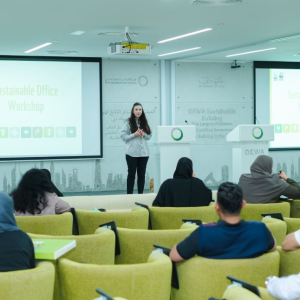The United Arab Emirates (UAE) continues to solidify its position as a global business hub with the introduction of a progressive new policy aimed at making it easier for businesses to expand and operate within the country. The Abu Dhabi Department of Economic Development (ADDED) has recently announced that companies can now open branches in the emirate of Abu Dhabi without the need to have physical premises for up to one year. This move is part of a broader strategy to enhance the ease of doing business in the UAE and attract more international investors.
This announcement has the potential to reshape the landscape for businesses looking to enter the UAE market or expand within the country. By eliminating the immediate need for physical office spaces, the policy removes one of the significant barriers to setting up a branch and offers companies greater flexibility and cost-effectiveness. This is expected to encourage more businesses, particularly startups and small and medium-sized enterprises (SMEs), to establish a presence in Abu Dhabi.
The Vision Behind the New Policy
The decision to allow businesses to operate in Abu Dhabi without a physical office for the first year is in line with the UAE’s broader goals to modernize and diversify its economy. The country has been investing heavily in infrastructure, technology, and policy reforms to create a more attractive business environment for local and foreign investors alike.

By streamlining the process for opening branches, the UAE aims to make it easier for companies to test the waters in the market before committing to long-term commitments, such as leasing office spaces and hiring a large team. This approach not only helps businesses minimize their initial investments but also aligns with global trends, where businesses are increasingly opting for flexible workspaces, remote work models, and virtual offices, especially in the wake of the COVID-19 pandemic.
This move also supports the UAE’s efforts to position itself as a leader in innovation and entrepreneurship. By providing companies with more opportunities to enter the market with fewer upfront costs, the government hopes to foster a culture of innovation and business development in Abu Dhabi, which could lead to greater economic diversification in the years to come.

Key Features of the New Policy
Under the new policy from ADDED, businesses wishing to set up branches in Abu Dhabi no longer have to secure physical office spaces immediately upon registration. This flexibility allows companies to operate remotely or from shared office spaces during the first year of their operation. After the one-year period, businesses will be required to establish a physical office, but they will have had ample time to evaluate their position in the market and make more informed decisions about their long-term presence in the region.
The policy applies to a wide range of businesses, from multinational corporations to SMEs, offering a unique advantage for companies looking to explore the potential of the Abu Dhabi market without being immediately burdened by the high costs of commercial leases. For companies operating in the technology, consulting, or service industries—where remote work is more feasible—this is a particularly attractive option.
The ability to test the waters without committing to expensive physical infrastructure could be especially beneficial for entrepreneurs and startups that are still in their early stages. With reduced operational costs and the flexibility to operate remotely, these companies can focus more on growing their business, expanding their client base, and enhancing their products or services.
Benefits for Businesses
- Reduced Operational Costs: For many businesses, particularly startups and SMEs, the cost of leasing commercial space is a significant financial burden. This new policy eliminates the need for a physical office in the first year, freeing up resources that can be better allocated toward other business priorities such as marketing, product development, or expanding the team.
- Flexibility in Operations: The ability to operate without a physical office for up to a year allows companies to have more flexibility in how they run their operations. Whether businesses opt for remote teams, coworking spaces, or home-based offices, they are free to adjust their operations as needed without the pressure of maintaining a long-term lease.
- Ease of Entry into the Market: For international companies or those looking to expand within the UAE, the policy offers a low-risk way to enter the market. Businesses can establish a branch and begin operations immediately, without the usual upfront costs and commitment of a physical office. This can help them quickly assess the viability of the market and gauge local demand for their products or services.
- Encouragement of Innovation: The UAE has long been a hub for innovation, and this policy is expected to further encourage entrepreneurship and creative business models. With less concern about securing office space, companies can focus on developing new ideas, fostering innovation, and building sustainable businesses that contribute to the UAE’s economic diversification goals.
- Attracting Global Talent: The flexibility offered by this new policy is likely to attract international talent to Abu Dhabi. Entrepreneurs and professionals can now relocate to the UAE and begin operations without worrying about immediately securing office space. This, in turn, could help boost Abu Dhabi’s standing as a global business destination, attracting skilled professionals from around the world.
Impact on the Abu Dhabi Economy
The impact of this new policy extends beyond the businesses that will benefit directly from it. By making it easier for companies to set up shop in Abu Dhabi, the policy is expected to contribute to the overall growth of the emirate’s economy. The influx of new businesses will likely lead to job creation, increased demand for services, and the development of new industries, all of which will benefit the local economy.
Moreover, the policy could help Abu Dhabi attract more foreign direct investment (FDI). The UAE has long been a popular destination for international companies looking to enter the Middle Eastern market, and this new policy further enhances its appeal. The added flexibility makes Abu Dhabi an even more attractive location for businesses, particularly those that operate in sectors such as technology, finance, and consulting.
Additionally, the policy is expected to promote competition and drive innovation. As more companies enter the market and seek to differentiate themselves, there will be greater pressure to innovate, deliver high-quality products and services, and offer competitive prices. This could ultimately benefit consumers and contribute to the development of a more dynamic and diverse business environment in Abu Dhabi.
Challenges and Considerations
While the policy is largely seen as a positive development, there are some challenges and considerations that businesses must take into account. Although businesses can operate without physical premises for up to one year, they will need to comply with other regulatory requirements, including licensing, reporting, and ensuring they adhere to local laws and standards. Additionally, the requirement to establish a physical office after the first year could present challenges for businesses that are still uncertain about their long-term prospects in the market.
Another consideration is the potential impact on commercial real estate in Abu Dhabi. While the policy may reduce the immediate demand for office spaces, it is expected that businesses will eventually need to secure premises, which could lead to increased demand for office space in the future. This could create a more competitive market for commercial real estate as businesses seek to establish a permanent presence in the city.
Conclusion
The decision by the UAE to allow companies to open branches in Abu Dhabi without physical premises for up to one year is a significant step forward in making the country an even more attractive destination for global businesses. This new policy provides companies with the flexibility to operate remotely or from shared spaces, reducing upfront costs and allowing them to test the market before committing to long-term investments. It is expected to foster innovation, create new opportunities for entrepreneurs, and contribute to the overall growth of Abu Dhabi’s economy. As the UAE continues to modernize and adapt to the changing business landscape, policies like this will play a key role in maintaining the country’s competitiveness and global appeal.
Do follow Uae stories for more Updates











